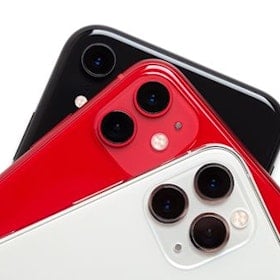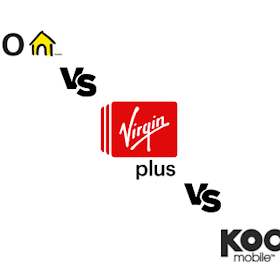
Apple unveiled the iPhone 15 series at its September event. This latest iteration of Apple's flagship smartphones introduces USB-C to the iPhone (finally). Other updates include camera improvements, better overall performance via new chipsets, and more. But do all of these warrant an upgrade from iPhone 14?
We'll compare the iPhone 14 to the iPhone 15 and help you find out if it's worth upgrading to this year.
iPhone 15 vs. iPhone 14 summary
There's no doubt that the iPhone 15 is the better phone overall, but are all the improvements enough to make your smartphone experience significantly better?
 |
 |
Worth upgrading? | |
|---|---|---|---|
| Price | |||
| Display | |||
| Processor | |||
| Camera | |||
| Battery Life | |
||
| Charging chord | |
||
| Design | |||
| iPhone 15 plans | iPhone 14 plans | BYOD plans |
iPhone 15 vs. iPhone 14: Specs
In many ways, the iPhone 15 specs look remarkably like the iPhone 14 specs. However, there are some key differences. For example, the base model iPhone 15 camera system now includes a 48MP main camera—a big upgrade from the iPhone 14's 12MP main camera. Here is how the iPhone 14 and iPhone 15 tech specs look side by side.
iPhone 15 vs. iPhone 14: Specs
| iPhone 14 | iPhone 15 | |
|---|---|---|
| Starting price | From $999 | From $1,129 |
| Display | 6.1” 120Hz Super Retina XDR |
6.1” 120Hz Super Retina XDR |
| Processor | A15 Bionic |
A16 Bionic |
| Main camera | Dual-lens 12MP main @ ƒ/1.5 12MP ultra-wide @ ƒ/2.4 2x optical/5x digital zoom Deep Fusion Photonic Engine |
Dual-lens 48MP main @ ƒ/1.6 12MP ultra-wide @ ƒ/2.4 2x optical/5x digital zoom Deep Fusion |
| TrueDepth front camera | 12MP @ ƒ/1.9 Cinematic mode up to 4K Autofocus Photonic Engine |
12MP @ ƒ/1.9 Cinematic mode up to 4K Action mode |
| Video recording | 4K HDR Cinematic mode (up to 4K) Action mode |
4K HDR Cinematic mode (up to 4K) |
| Internal memory | 128GB 256GB 512GB |
128GB 256GB 512GB |
| Battery life | Up to 20 hours video | Up to 26 hours video |
| Connectivity | 4G LTE 5G (sub-6 GHz, mmWave) Bluetooth 5.3 Emergency SOS via satellite |
4G LTE 5G (sub-6 GHz, mmWave) Bluetooth 5.3 |
| Water resistance | IP68 | IP68 |
| Colours | Blue Purple Midnight Starlight (PRODUCT) RED |
Black Blue Green Yellow Pink |
iPhone 15 vs. iPhone 14: Price
The iPhone 15 starts at $1,129 for the 128GB storage option, while the same iPhone 14 version has since been marked down to $999. While not the highest prices you'll see for smartphones, they are still certainly up there. (You can help take the sting out of those costs by signing up with a carrier's phone payment plan.)
All the updated features just might be worth the extra cash if you absolutely need a new phone (your current phone will not reset or is physically broken, can't support the latest software updates, or can't hold a charge) and are only choosing between these two devices. But if you're simply upgrading from the iPhone 14, keep your wallet shut—the changes aren't groundbreaking enough to warrant the expense.
Is it worth an upgrade? If you already own an iPhone 14, stick with it. If you're purchasing new or trading in to upgrade from an older model, the iPhone 15 is the better pick.
Change your plan, not your phone
The annual phone releases may bring some sparkly new features and specs, but for the most part, many of the "improvements" end up being things most of us don't really notice or use. Unless you absolutely need a new phone, we always suggest keeping the one you have to avoid the high costs of a new device.
Better yet, taking your current phone and switching from a big carrier's expensive phone plan to a much more affordable MVNO phone plan can save you so much money in the long run. And you don't even have to worry about getting bad signals because these carriers run on the same big networks of the major Canadian carriers like Rogers, Telus, and Bell. Here are some of the most popular smaller carriers with great service on the major networks you are used to:
iPhone 15 vs. iPhone 14: Display

At first glance, the display specifications of the iPhone 14 and iPhone 15 might look strikingly similar: both sport a 6.1” 120Hz Super Retina XDR display. But as with many tech advancements, the devil is in the details.
Previously exclusive to the iPhone 14 Pro models, the Dynamic Island makes its way to the iPhone 15, broadening its accessibility to a wider audience. This interface update brings life into the upper part of the display. With Dynamic Island, users can get real-time glimpses into background activities, from live music playback and current sports scores to instant access to Apple Maps directions. It essentially transforms the old notch of the screen into an active, informative, and engaging space.
Beyond the Dynamic Island, the iPhone 15 nudges ahead with a marginally brighter screen. This can be particularly beneficial in conditions like direct sunlight or well-lit environments where every nit of brightness can make a difference in screen visibility.
Is it worth the upgrade? No.The Dynamic Island, while an engaging and innovative feature, doesn't fundamentally change how most users interact with their phones on a day-to-day basis. Its ability to display real-time activities, although visually impressive, might not be a necessity for many, especially those already accustomed to the iPhone 14's display. Furthermore, while the added brightness on the iPhone 15 is commendable, the iPhone 14's display was already exceptional in most lighting conditions.
iPhone 15 vs. iPhone 14: Processors
Following a new approach Apple started with the iPhone 14, the tech company is putting the same chip found in the Pro models of the previous series into the base models of the newer series. That means the iPhone 14 Pro's A16 Bionic chip is in the base models of the iPhone 15 (the iPhone 15 Pro gets the new A17 Bionic).
In practical terms, what does this mean? It signifies a performance boost for the iPhone 15 base models compared to the iPhone 14 base models. This translates to better multitasking, enhanced gaming experiences, improved energy efficiency, and refined camera features. The advanced chip will get you more out of the latest iOS. But let's be realistic: We expect improvements with each new iteration of a smartphone. It would be a shock if Apple announced a new iPhone that lagged behind its predecessor instead of being the best to date. But these improvements are exactly that—improvements, not game-changers. In the grand scheme of things, with the high performance of modern smartphones, the distinction between generations becomes increasingly subtle. Until a groundbreaking technological leap occurs, we're looking at modest enhancements with each new release.
Is it worth the upgrade? For the average user, the answer is likely no. While the iPhone 15 surely boasts better performance metrics, the iPhone 14 still packs a punch, and the changes are not groundbreaking enough to warrant a switch. If your iPhone 14 is serving you well, it's advisable to hold onto it and wait for a more substantial upgrade in the future.
iPhone 15 vs. iPhone 14: Cameras
If the processors weren't enough to make the iPhone 15 feel like a remodeled version of the iPhone 14 Pro, the new iPhone 15 camera system might seal the deal. The biggest change is the addition of the 48MP main camera, which was introduced with the iPhone 14 Pro last year.
Here’s a look at how the two camera systems stack up against each other:
- iPhone 14/14 Plus:
- Dual-camera array
- Main: 12MP, ƒ/1.5 aperture
- Ultra-wide: 12MP, ƒ/2.4 aperture
- 2x optical zoom out, digital zoom up to 5x
- True Tone flash
iPhone 15:
- Dual-camera array
- Main: 48MP, ƒ/1.6 aperture (12MP telephoto with 2x zoom)
- Ultra-wide: 12MP, ƒ/2.2 aperture
- 3x optical zoom in, 2x optical zoom out, digital zoom up to 15x
- Adaptive True Tone flash
The 48MP main camera in the iPhone 15 is a game-changer for the base models. This move from the iPhone 14's 12MP main camera represents a quadrupling in pixel count. Apple leverages pixel-binning (a technique where multiple pixels are combined to form one pixel). By default, the iPhone 15 captures images in 24MP using this method, which helps to increase dynamic colour range and sharpness.
The iPhone 15's increased resolution has enabled a new 2x zoom option, which takes a 12MP slice from the center of the sensor., essentially turning it into a third telephoto camera. So, even though you'll only see two camera lenses at the back of the iPhone 15, the system works like a triple camera array.
The inclusion of an Adaptive True Tone flash suggests improvements in low-light photography, adjusting the flash intensity and colour temperature based on the environment, ensuring more natural-looking shots.
Is it worth an upgrade? While this represents one of the most significant improvements in the iPhone's base models, we don't think it's necessarily appealing to the average user. Most people today use their smartphones for casual photography—capturing moments with family, taking photos of daily life, or occasional scenic shots. The iPhone 14 already does an excellent job in these areas. The added megapixels and advanced zoom features of the iPhone 15 are undoubtedly tempting for photography enthusiasts, but for the everyday user, the camera on the iPhone 14 is more than sufficient.
iPhone 15 vs. iPhone 14: Battery life
One of the most crucial aspects for many users when considering a new phone is battery life. No one likes to be tethered to a charger throughout the day or searching for an outlet during an outing. It's undeniable that Apple has made a significant stride in this department with the iPhone 15.
The iPhone 15 promises an impressive six-hour increase in video playback compared to the iPhone 14. This doesn't just mean more binge-watching your favorite shows or streaming videos; it translates to longer usage times for everyday tasks, from browsing to gaming, without needing a recharge.
Still, the iPhone 14 already offers a battery life that meets the daily needs of most users. It's rare for an average iPhone 14 user to find their device drained before the day ends—unless they're pushing the phone to its absolute limits.
Is it worth the upgrade? While the promise of extended battery life is enticing, we stand firm in our belief that the iPhone 14's battery life is already sufficient for the majority. Unless you find yourself regularly depleting your iPhone 14's battery early in the day, there's no compelling reason to upgrade just for the battery improvement. Stick with your iPhone 14 and save your money.
iPhone 15 vs. iPhone 14: Charging cord

The evolution of charging ports and connectivity options on iPhones has been a topic of intense discussion for years. From the classic 30-pin dock connector to the Lightning port, each change has invoked varied reactions from the Apple community. This year, Apple has introduced another significant shift: the debut of the USB-C port in the iPhone 15.
Was it global regulatory pressure that nudged Apple in this direction? Yes—yes, it was. But regardless of the motive, the adoption of USB-C stands as a monumental leap. Arguably, this transition is the most pivotal of all the enhancements introduced in the iPhone 15, allowing so many iPhone users to minimize their chord clutters, and strip down to a USB-C chord to charge all of their devices. However, it's important to know that on the base models, data transfer will be limited to USB-2 speeds, and charging speeds aren't going to be cut down.
Is it worth the upgrade? No, but it's close. When evaluating the iPhone 15 as a whole, the introduction of USB-C emerges as the change with the most tangible benefits for users. If you've been longing for a simplified charging ecosystem, or if you're tired of juggling multiple cables for your myriad devices, the iPhone 15's USB-C integration might be the push you need to consider an upgrade. While the iPhone 14's Lightning port isn't obsolete, the future clearly lies with USB-C.
iPhone 15 vs. iPhone 14: Design
At first glance, the iPhone 15 looks like... the iPhone 14. You're going to have to peer a little deeper to see some of the more significant design changes. Brushed metal on the iPhone 14 replaces the glossy backing of the iPhone 14, contoured edges allow for a more natural feel in the hand, bezels are thinner, and a removable back glass will allow for easier and cheaper phone repairs.
Colours

The iPhone 15 offers a revamped colour palette compared to the iPhone 14. Of note is the new pink iPhone 15, which may be unintentionally riding the wave of the popular Barbie movie. On the other hand, the iPhone 14 presented a more subdued set of choices. Both lineups have their appeal, but if you're simply looking for fresh hues, the iPhone 15 might catch your eye. Yet for many, colour alone won't be the deciding factor for an upgrade.
Is it worth an upgrade? The iPhone 15 brings subtle design refinements over its predecessor, but they aren't groundbreaking. Unless you're particularly drawn to the aesthetic changes or new colours, it might be wise to stick with the iPhone 14 for now.
iPhone 15 vs. iPhone 14: Sustainability
At the iPhone 15 event, Apple placed a lot of focus on sustainability and its goal to eventually be carbon neutral. To that end, the iPhone 15 includes 100% recycled cobalt in the battery and 100% recycled copper foil in the MagSafe charger. Plus, 75% of its aluminum enclosure is also recycled.
While all of this is nice, the fact of the matter is that if sustainability is important to you, buying a brand-new phone when you really don't need one is counterproductive. The most sustainable option is always to use what you already have for as long as it remains functional. Manufacturing new products, even with recycled materials, consumes resources and energy. Also, disposing of or even recycling old electronics can have environmental implications.
Is it worth an upgrade? From a sustainability standpoint, it's commendable that Apple is taking steps to reduce its environmental impact. However, the true green choice is prolonging the lifecycle of devices you already own. Upgrading for the sake of sustainability paradoxically goes against the very principle. If you're using an iPhone 14 and it serves your needs, the environmentally conscious decision would be to stick with it.
iPhone 15 vs. iPhone 14: verdict: Should you upgrade?
Let's be clear here. The iPhone 15 is the better phone in this comparison. It has a superior camera system, better processor and overall performance, UCB-C, and a subtly improved design. If you don’t currently have an iPhone (or have a much older model) and are deciding between the iPhone 14 and the iPhone 15, go with the iPhone 15.
However, for those already on an iPhone 14 (and especially those with the 14 Pro), the improvements might not warrant the jump. Stick with the iPhone 14. You still have a great machine in your hands that is ready to meet your demands. Plus, you'll save big on not having to purchase a new iPhone or get caught up in a long and drawn-out finance plan.
If you've decided to get an iPhone 15, compare the iPhone 15 vs. 15 Plus vs. 15 Pro vs. 15 Pro Max to see which Apple handset is right for you!
iPhone 15 vs. iPhone 14: FAQs
What's the major difference between the iPhone 15 and iPhone 14?
The major differences between the iPhone 14 and iPhone 15 include the iPhone 15 offering an improved camera, a more powerful processor, USB-C compatibility, and a slightly refined design.
Has the battery life improved on the iPhone 15?
Yes, battery life has improved for the iPhone 15. Apple claims the iPhone 15 has an optimized battery life extending visual playback power by six hours, though real-world usage can vary based on individual habits.
Can I use my iPhone 14's charger with the iPhone 15?
You cannot use the iPhone 14's charger with the iPhone 15. With the introduction of USB-C in the iPhone 15, previous Lightning chargers won't be directly compatible. You'll need a USB-C charger or an adapter.
Is the iPhone 15 more durable than the iPhone 14?
The iPhone 15 isn't necessarily more durable than the iPhone 14, but the new replaceable back glass will make it easier and cheaper to get the iPhone 15 repaired.
Related Articles
Find Better Phones and Plans
Hundreds of cell phone plans unpacked. All the facts. No surprises.










































